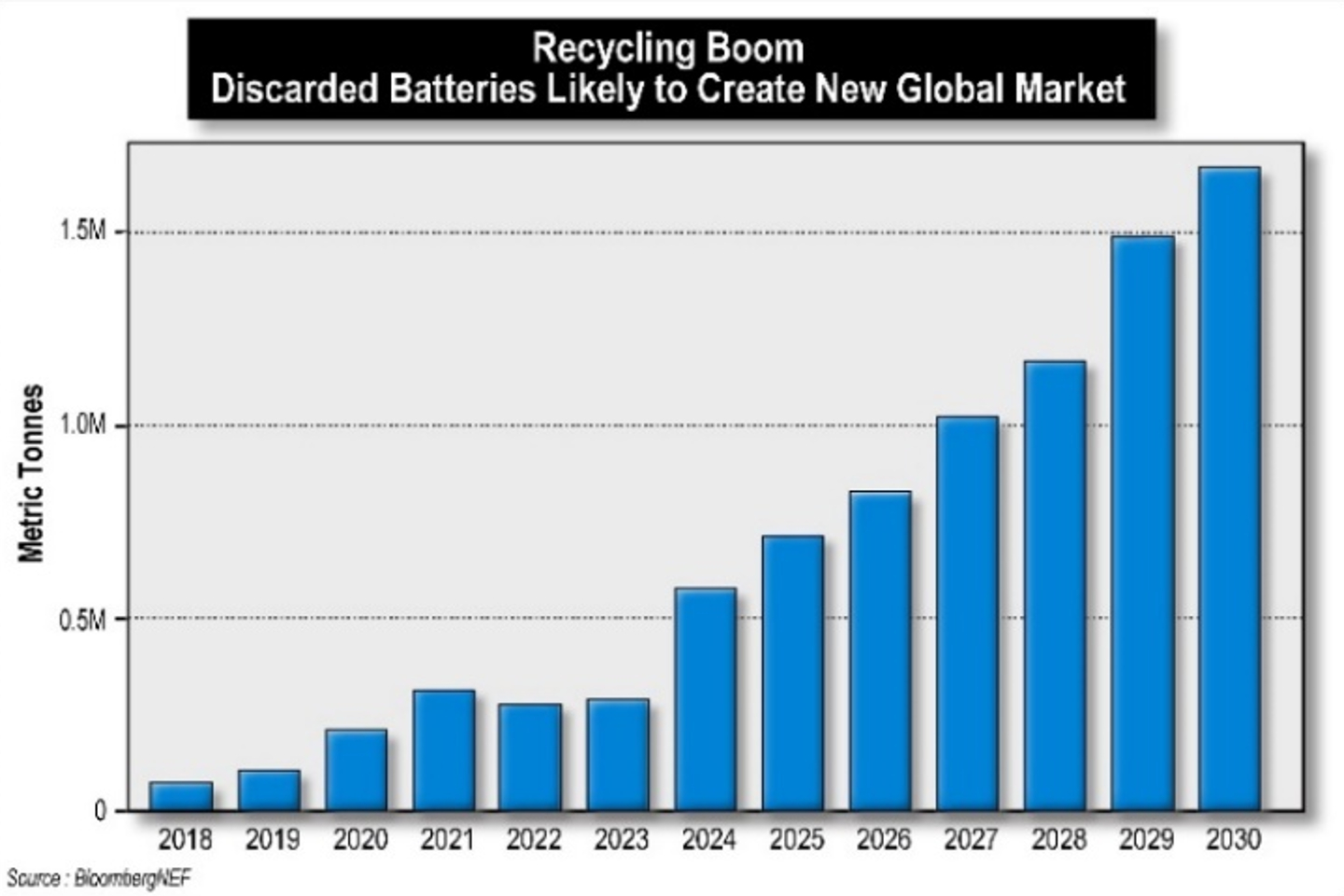Neometals has completed a scoping study for its proposed lithium-ion battery recycling and processing initiative, with results showing encouraging economic outcomes for an initial 10-year plant life. The company will process about 18,000 tonnes of exhausted LIBs per annum and churn out a pre-tax NPV of $308m and IRR of 72%, with a CAPEX cost of $92m and payback in less than two years.


Neometals looks like it might be onto something with its proposed lithium battery recycling process, with a scoping study this week revealing that the development could spit out $72m per year of pre-tax cashflow over an initial 10-year plant life.
In an attempt to get ahead of the curve and effectively “close the loop” in the lithium cycle, the company has been operating a small-scale, pilot-type, lithium-ion battery, or “LIB”, recycling plant in Canada.
Neometals recently awarded contracts to construct and operate Stage 1 of its LIB recycling pilot plant to SGS Canada Inc.
Stage 1 effectively shreds the LIBs and removes the metal casings and plastics, leaving the raw materials for the mineral processing and chemical extraction via hydrometallurgical techniques during the second stage of the process.
And it is the recovery of the valuable cobalt, nickel, lithium, copper, iron, aluminium and manganese metals from the battery components, that has the company excited, with the scoping study showing excellent margins.
Neometals says that it will recover cobalt, nickel, copper and lithium as high-purity sulphate salts with an estimated operating cost of less than USD$7 per pound of contained cobalt as cobalt sulphate before other by-product credits are even taken into account.
This week, cobalt was trading for nearly USD$15 per pound and has been as high as USD$40 per pound in the last year.
The company has landed on an optimal production rate of 50 tonnes per day, or just over 18,000 tonnes per annum of raw recycling feed of the LIBs, from which it will recover the metallic products.
Key highlights of the scoping study outlined a total CAPEX spend of AUD$92m, with a pre-tax NPV of AUD$308m and IRR of 72%, with payback in less than two years.
Neometals has applied for provisional patents for the proprietary process, which are pending both in Australia and Europe.
The company’s pilot plant test work in Canada will be followed by engineering and feasibility studies to fully optimise and cost the proposed battery recycling process flowsheet.
Management said it was encouraged by the outcomes of the study and supported its strategy to target sustainable recycling solutions for LIBs, as their expected uptake in electric vehicles and energy storage applications grows exponentially in the coming decade.
Neometals Managing Director Chris Reed said: “We are pleased with the economic outcomes of the Scoping Study on our new flowsheet; it is a credit to our project team and our consulting engineers. We have proved the efficacy of our process at the bench scale and continue to de‐risk and optimise in the current pilot plant in Canada.”
“The global adoption of electric vehicles and battery storage of renewable energy continues at a rapid pace and the direct result will be a massive volume increase in production scrap and end‐of‐life lithium batteries from consumer electronics and electric vehicles.”
“Governments world‐wide are legislating and planning to legislate compulsory lithium battery recycling to remove them from landfills and responsibly recover the majority of their constituents, creating an ethical and sustainable supply chain.”
“We have invested in a true ‘recycling’ solution rather than base metal recovery process. It has been engineered for real-world conditions and recovers multiple high‐purity chemical products from an array of battery chemistries.”
Only about 5% of LIBs are presently recycled globally, although worldwide, regulations are tightening with haste and hence, the opportunity here for the company looks like a no-brainer, given the expected explosion in electric vehicle sales.
Neometals has initiated commercial discussions with potential partners to start tailoring the staged process and deliver the requested battery-grade chemicals in the form and quantity that they are required.
Next steps include a front-end engineering study and then the completion of an economic feasibility study to give the company commercial information relating to about 80% of the overall costs at an early development stage.
An indicative project timeline has the construction and fabrication of a suitable commercial recycling and processing plant during the first quarter of 2021, subject to board approval.












